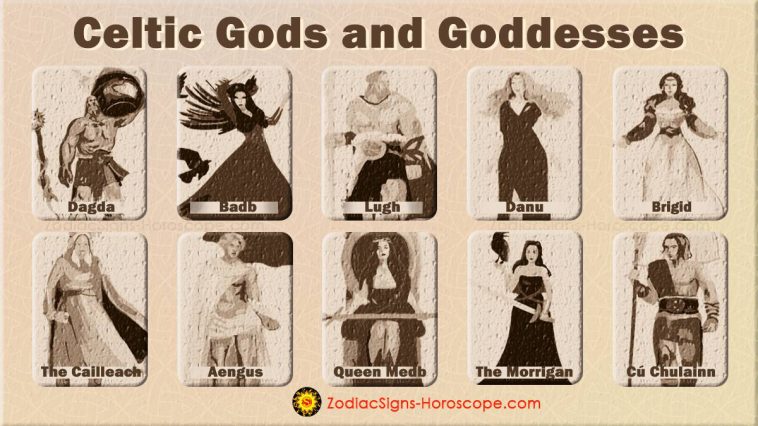Learn About The Celtic Gods and Goddesses
Within the ancient culture, many Celtic gods and goddesses served as powerful symbols of a higher divine power. However, although they are immortal and possess infinite wisdom, they also retain very human traits, as well. This made them more relatable to the Celts, and thus they felt that they could more easily achieve certain god-like qualities and behaviors.
Although much of what we know about the Celts varies, as it has mostly been passed down through art and oral tradition, there are many certainties that we know because of the Romans and Greeks, who kept records of Celtic beliefs and traditions. These records tell of the logistics, but they fail to capture the magic and soul of the Celtic belief culture. To fully grasp the nature of their religion(s), we must supplement the written records with ancient artwork.
Many gods and goddesses emerged from Celtic lore and tradition, but here we will focus only on the top players, those who made the biggest statement across a variety of avenues.
The “Great Queen” Morrigan
The “Great Queen” Morrigan is known as the goddess of war, with other nicknames such as “Phantom Queen” or “Queen of Demons.” She was thought to hover over the battlefield in the form of either a crow or a raven, directly affecting the outcome of the battle. Morrigan is often paired with Dagda, with whom she had intimate relations and aided him in battle. After being refused the same offer by the god.
Cuchulainn
Cuchulainn was filled with rage, allowing him to die in battle. It is said that he died with a crow manifestation on his shoulder. Cuchulainn was a rough and tough god of many adventures who thought he would defeat death. Unfortunately, he refused Morrigan’s offer of immortality.
Celtic Gods and Goddesses
Cernunnos
Cernunnos, one of the most influential Celtic gods, was always portrayed as possessing stag antlers upon his head. Stags are symbolic of sexuality and productivity to the Celts, so this put him high atop the list of the gods. They prayed to him for abundance in growing and hunting, invoking him for fertility on “special” nights.
The Triple Mother Goddess
The Triple Mother goddess was just what it sounds like the combination of three feminine forces. She was a solid force to be reckoned with, as three is one of the most significant and symbolic numbers in Celtic tradition. The Triple Mother assisted with the success of the harvest and hunt and also provided health for her patrons. Most obviously, though, she signified the physical stages of the female life: maiden, mother, and crone. This trinity was a sign of power and fertility, not weakness. She was typically portrayed as a three-headed woman with supernatural abilities.
Epona
As the horse goddess, Epona was invoked most during the equinoxes, to guarantee the smooth passage of seasons. The Celts called upon her powers to help them during times of transition, as she is hailed for her grounding and supportive nature. Epona was a guardian for the Celts and was always pictured leading the way on horseback. We also mustn’t forget about Blodeuwedd, who was the goddess of spring, flowers, the night, and wisdom. The lessons that are taught through her story are seemingly endless.
Celtic Gods and Goddesses
Danu
One of the most important and powerful goddesses, though, is Danu. She is the absolute matriarch of the Celtic god family, Tuatha de Danaan. Her supposed father, Dagda, was called “The Good God”. He was thought to have super-human strength and resurrection capabilities and was usually depicted with a large club, two pigs, a harp, and a great cauldron for providing food. He is often paired with Morrigan and is thought to be the father of several other gods and goddesses.
Belanus
Belanus, the sun god, was turned to during times of war. He was thought to inspire soldiers, ensuring that they would fight valiantly and fiercely to the death. Because the battle was a shining moment in a Celtic man’s life, Belanus would have been very highly revered. Others view him as the god of higher reasoning, who would help the Celts to reach enlightenment.
Tuatha-de-Danann
Lastly, we can explore the name of the prominent family of Celtic gods, Tuatha-de-Danann. Their name means, “Children of the Goddess Danu”, who was mentioned previously. Although Danu was both the matriarch and the chief goddess, she was not the actual mother of the gods- that whole bit was a bit messy. This family perfected their wisdom and use of magic and were greatly praised and called upon by the Celts.


